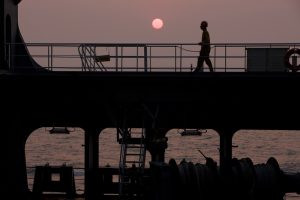
Seafarer abandonment
Abandonment affects real people, often leaving them in a desperate plight. Loss of wages impacts the seafarer and their family. Health may suffer and there may not be medical help. Food supplies may run out. Uncertainty about how and when the seafarer or seafarers can get home can cause a huge toll.
IMO is continuing to focus its efforts on improving the situation usually through the diplomatic efforts of the Secretariat and the IMO Secretary-General. The issue of abandonment of seafarers has been recognized as a serious issue by Secretary-General Kitack Lim. The IMO Legal Committee is the main forum where the issue is discussed. Updates from IMO and ILO secretariats are provided and the Committee meetings provide an opportunity for the issue of abandonment to be raised. The Legal Committee is attended by representatives from Member States as well as relevant international NGOS in consultative status representing the shipping industry, charities and seafarers. Seafarer-related issues constitute a continuing thread that has run through IMO’s work for several decades. On the one hand, the clear understanding that seafarers are ultimately responsible for implementing many of IMO’s measures have led to standards for seafarer training, certification and watchkeeping being developed and enshrined in the STCW Convention. On the other hand, a related concern for their welfare, both as employees and as individuals, is evident in IMO’s continuing work on issues such as fatigue, fair treatment and liability and compensation for seafarers. IMO’s annual Day of the Seafarer, celebrated each year on June 25th, is the Organization’s global campaign to give wider recognition to seafarers. Seafarer abandonment is a serious problem that can blight the lives of those caught up in it. It must be tackled and it needs continual cooperation, not just between IMO and ILO and non-governmental organizations devoted to seaman’s welfare, but with flag States, port States and other industry groups too. We all have a human duty to protect seafarers.
Guidelines and MLC regulations
A joint working group of IMO and the International Labour Organization (ILO), which reported to both IMO’s Legal Committee and ILO’s governing bodies, developed Guidelines on Shipowners’ Responsibilities in Respect of Contractual Claims for Personal Injury to or Death of Seafarers. Then,new obligations under the Maritime Labour Convention (MLC 2006) were developed and adopted in 2014. These require shipowners to have compulsory insurance to cover abandonment of seafarers, as well as claims for death or long-term disability of seafarers. (See 2014 MLC amendments). In 2017, the MLC amendments entered into force. Guidelines on Provision of Financial Security in Case of Abandonment were adopted in 2001 (Resolution A.930(22))
Guidelines for port State and flag State authorities on how to deal with seafarer abandonment cases
The first meeting of a joint International Labour Organization (ILO)–International Maritime Organization (IMO) Tripartite Working Group (December 2022) adopted guidelines on how to deal with seafarer abandonment. Read more here. The guidelines (draft version) are here – final guidelines text will be available in January 2023.
Seafarer abandonment – a real problem
Cases of abandonment of crews reported to the IMO/ILO database have continued to rise. The stressful and inhumane consequences for the abandoned crew on board, and for their families, may be illustrated with the recent cases of a total of 14 Indonesian crew in Port Alang, India, on board Miss Gaunt and Northwind. Both ships are registered in the Kingdom of the Netherlands in the registry of Curaçao. In January and February 2019, IMO continuously received messages from the crew that they were not being paid by the shipowner nor by the insurer. Therefore, they could not provide the necessary means of living for their families and young children whom they had not seen for more than seven months. Meanwhile, the crew could not be repatriated because the port State, India, claimed that the ships could not be moved to a safe lay-up harbour and that a new replacement (skeleton) crew was required. Furthermore, these two abandonment cases were connected to the abandonment of another eight Indonesian seafarers on board the AHT Carrier in Maputo, Mozambique. All three ships are insured with the same insurer and beneficially owned or managed by the same company. Through the continuous and substantial involvement of the IMO and ILO Secretariats, the insurer has now paid four months’ wages to all of Miss Gaunt’s crew. All the crew members were finally repatriated by the end of March 2019, and a similar solution seems to be underway for the crew of the Northwind. The crew of the AHT Carrier was also repatriated. However, these cases can only be considered as being resolved if all outstanding wages have been paid in full.
Joint ILO-IMO meeting adopts guidelines on seafarer abandonment
New measures to improve conditions for seafarers, including those who have been abandoned, have been adopted at a meeting involving governments and maritime workers and employers’ organizations. Guidelines on how to deal with seafarer abandonment were adopted by the first meeting of a joint International Labour Organization (ILO)–International Maritime Organization (IMO) Tripartite Working Group.

The Guidelines seek to address the significant rise in cases of abandonment of crews reported to the ILO, which have risen from less than 20 cases per year between 2011 to 2016, to 40 in 2019, 85 in 2020, 95 in 2021 and 114 cases as of mid-December 2022. The Guidelines aim to improve coordination among countries, including flag States, port States, States in which seafarers are national or resident, and States in which recruitment and placement services operate, in order to resolve abandonment cases more quickly, including getting seafarers paid and repatriated home to their families. The new Guidelines draw on relevant ILO international labour standards, notably the Maritime Labour Convention, 2006, as amended (MLC, 2006), including its most recent amendments; an earlier joint ILO-IMO resolution adopted in 2001 (Resolution A.930(22)); relevant IMO international frameworks and agreements; and relevant trends and developments in regional and national law and practice.
Under the MLC, 2006, flag States – countries where ships are registered and/or whose flag the ships are flying – must ensure a financial security system is in place for ships under those flags. The new Guidelines encourage flag States to verify, at least annually, the validity of this financial security. Port States are encouraged to pay particular attention to this financial security while inspecting foreign ships that visit their ports. States, where recruitment and placement services operate, are also called upon to regularly verify that those services include a system to ensure the protection of the seafarers they recruit and place.
The new Guidelines set out procedures to be taken by States if a shipowner fails to fulfil their obligations to arrange and cover the cost of repatriation of seafarers, outstanding wages and other contracted entitlements, and the provision of essential needs, including medical care. In these circumstances, seafarers are then considered abandoned. These procedures include developing, in cooperation with seafarers’ and shipowners’ organizations, national Standard Operating Procedures (SOPs) to define the liabilities and obligations of the competent authority and the roles to be played by the various national stakeholders. These stakeholders include the relevant national seafarers’ welfare boards, shipping agencies, seafarers’ and shipowners’ organizations, seafarer welfare organizations, seafarer recruitment and placement services, and others.
The ILO–IMO meeting also discussed the importance of the joint ILO-IMO database relating to abandoned seafarers, and the need to update and improve it.
The Tripartite Working Group’s first meeting brought together more than 250 representatives and observers from Governments and Shipowners’ and Seafarers’ representative organizations, to identify and address seafarer issues. The meeting was held in hybrid format in Geneva from 13–15 December 2022. The outcomes of the meeting will be reported to the ILO Governing Body and IMO Legal Committee in 2023.
Read more on seafarer abandonment.
Source: IMO


Thanks.